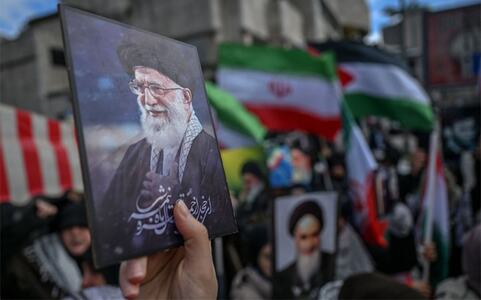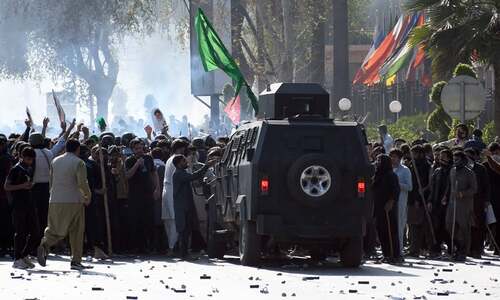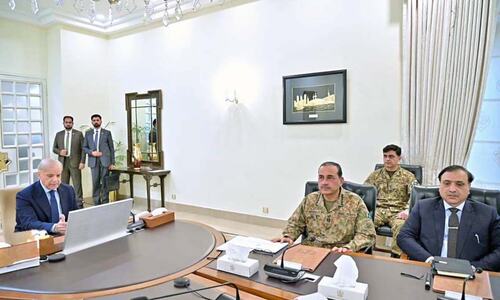• PM warns of locking down major cities if cases surge
• Fears Pakistan might face India-like situation
• NCOC data shows 144 deaths
• New policy for international travellers soon
ISLAMABAD: Prime Minister Imran Khan on Friday said the army would be deployed to assist the police in enforcing standard operating procedures (SOPs) against Covid-19, fearing Pakistan could face a situation similar to that of India’s if the current infection rate persisted.
He also warned of locking down major cities if cases continued to surge.
Addressing the nation after presiding over a meeting of the National Coordination Committee (NCC) on Covid-19, Prime Minister Khan said like many countries, Pakistan too was facing shortage of Covid-19 vaccine as a result of which the target of meeting the goal of herd immunity would take at least a year to be achieved.
According to NCOC data, Friday saw another 144 people dying from coronavirus, taking the country’s overall death toll to 16,842. The highest positivity rate was recorded in Mardan at 51 per cent.
“I have asked Pakistan Army to assist the police and law enforcement agencies in enforcing SOPs to check the spread of coronavirus,” the prime minister said.
“If Covid-19 cases continued to surge, the government would be compelled to impose lockdown in big cities. I am appealing to you to follow SOPs so that we do not have to take steps which India is taking, like imposing lockdowns. Half of the problem is solved when you wear masks,” he added.
Meanwhile, the National Command and Operation Centre (NCOC) announced new SOPs, under which schools in districts with over five per cent positivity rate would be closed till Eidul Fitr and markets by 6pm.
Indoor and outdoor dining has been banned till Eid, with only takeaways and delivery permitted while office timings have been limited to 2pm with 50pc staff attendance.
India was hit hard by the deadly virus on Thursday when 314,835 cases were reported in a single day, making it the highest one-day tally anywhere. Due to such a high number of patients, hospitals are facing multiple problems, including oxygen shortage.
“If our circumstances become the same as India, then we will have to close down cities. We cannot do that because, as experience has shown, the poor suffer the most when lockdowns are imposed,” the prime minister pointed out. He said people were suggesting him to impose a lockdown but he would not do so because it would once again bring suffering to the daily-wage earners and labourers.
“That is why we have not taken the action,” he added.
Mr Khan called on the nation to start adopting precautionary measures in the same way as it did last year during Ramazan. “Pakistan was the only country which had kept mosques open last year during the holy month. I was happy with the way our religious scholars and imams informed the people about the precautionary measures,” he said.
Prime Minister Khan, however, said very few people were following SOPs, adding that, “If we do not take precautionary measures, we will have to impose a lockdown which will affect our economy at a time when it is on the rise.”
He said the government was making all out efforts to procure vaccines.
“We have asked China, but their demand is also quite large. There is a shortage in the rest of the world,” he said, adding that, “even if we get the vaccines today, it will take at least a year for them to have an impact.”
He hoped that once the nation started following SOPs, the number of cases would decrease.
“Until we face this together, we will not be able to win. I remember how a year ago people followed SOPs before Ramazan because they were scared,” the prime minister said.
He hoped citizens would follow health guidelines so that the government was not forced to shut down cities.
Minister for Planning, Development and Special Initiatives Asad Umar said the NCC meeting had agreed on shutting down all non-essential businesses by 6pm while offices would function till 2pm.
He said schools in districts with a positivity rate of more than 5pc would remain closed till Eid, including grades 9-12.
Mr Umar, who also heads the NCOC, said this would allow people to go for necessary purchasing and urged women to do their Eid shopping earlier and not wait till the last week before the festival.
He said a new policy would be announced in a day or two for international travellers, which includes their quarantine and vaccination procedures.
“There will be strict enforcement of the 50pc work-from-home policy and a complete ban on outdoor dining till Eid,” he added.
The minister said there was also pressure on the country’s oxygen supply as its plants were operating at 90pc of their capacity.
He said out of this percentage, around 80pc was being used for Covid-19 patients only.
The meeting also deliberated on how to improve oxygen supply and if needed, necessary steps would be taken to import it.
Special Assistant to the Prime Minister on Health Dr Faisal Sultan said the daily number of critical patients was over 4,000, which was far higher than the previous two waves.
He said this coupled with the 10pc positivity rate reflected that the pandemic was spreading.
In some cities, he said the rate was 20pc or more, putting strain on the health system.
“We have apprehensions that the situation may worsen, and then we will be forced to take tough decisions and go for a lockdown,” the prime minister’s aide said.
Inter-city transport ban Chief Minister Syed Murad Ali Shah said the positivity rate in Sindh had been less than other provinces but later started to rise.
Attending the NCC meeting via video link, the chief minister said the positivity rate had been 4pc in Karachi and 5pc in Hyderabad but during the last one month it had increased to 16.64pc in Hyderabad, 8.93pc in Karachi and 5.64pc in the rest of the province.
“This is a very serious situation, and we would have to take strong decisions otherwise things could get out of control,” he said, adding that lockdowns would have to be imposed to save people.
The chief minister said had the federal government decided to impose a ban on inter-city transport as was suggested by him on March 31, the situation would have been under control in Sindh. “It is time to take strong decisions and ban inter-city transport, ensure strict vigilance at airports, impose lockdowns in districts where cases are on the rise, declare vaccination mandatory for doctors and policemen, strict administration and allow the provinces, particularly Sindh, to procure vaccines directly,” he added.
Published in Dawn, April 24th, 2021
































